
Clockwise from top left: lawyer Liudmyla Lysenko in Kyiv; restaurant co-owner Iryna Savchenko in Kramatorsk; tour guide Artem Vasyuta in Odesa; homemaker Natalia Kucherenko in the Sumy region; obstetrician Iryna Kulbach in Dnipro; and architect Max Rozenfeld in Kharkiv.
Claire Harbage / NPR
Russia’s military assault on Ukraine began a decade ago, when it occupied the southern peninsula of Crimea. A bloody invasion of eastern Ukraine, which involved active-duty Russian troops, the West says, followed.
Two years ago, that localized conflict gave way to a full-scale invasion by Russia's armed forces that has shaken every corner of Ukraine.
On this grim anniversary, NPR visited people in six Ukrainian cities who have adapted, each in their own way, to war — and maintained a sense of hope.
Loading...
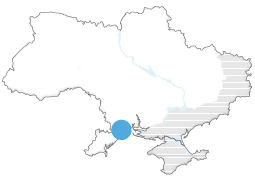
Odesa
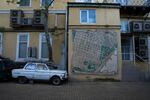
A historic map of the city is seen on a wall in Odesa.
Claire Harbage / NPR
Artem Vasyuta offers tours of his legendary hometown even during war.
"My official title is tour guide, but I do this job because I want to tell Odesa's story," he says, pausing. "A story that includes Ukrainians."
Located on Ukraine's southern coast, Odesa is known as the Pearl of the Black Sea. Its port used to be a heady, multicultural crossroad where the dominant language was Russian. But Russia's full-scale war on Ukraine all but shut down the port and its exports. And two years later, Odesa has lost all sentimentality for anything related to Russia.
In December 2022, locals took down an enormous statue of Catherine the Great, the Russian empress credited (unfairly, many Ukrainians say) as the city's founder. Vasyuta points to the empty base where the statue once stood and says he's not sorry.
"Russians are trying to erase us as a country," he says. "I don't see why we shouldn't erase their imperial monuments." And, he adds, "So much of Odesa is viewed through a Russian-Soviet lens. Our own place in our own city has been out of view."
Loading...
The tour guide has grown ambivalent about Odesa's reputation as a hedonistic city of crime — "another Russian-Soviet myth," he says — immortalized by the fictional gangster Benya Krik in Soviet-Jewish writer Isaac Babel's Odessa Stories.
Vasyuta appreciates Babel, who was swept up by the Stalinist purges and executed during World War II, and often takes visitors to the writer's childhood neighborhood of Moldavanka, which in the early 20th century was a center of Odesa's vibrant Jewish community. But he also includes stops by monuments and plaques dedicated to Ukrainian politicians, poets and scientists.
"This war has made me want to show every single one of them," he says. "The more the Russians bomb us, the more Ukrainian they make this city."
After repeated Russian attacks last summer damaged dozens of cultural sites in Odesa, UNESCO added Odesa's historic center to its World Heritage List. Meanwhile, the Russian navy's Black Sea Fleet, which had its headquarters in Sevastopol on the occupied Crimean Peninsula, has largely fled after Ukrainian attacks. Odesa's port is exporting again.
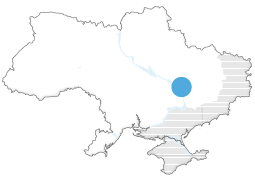
Dnipro
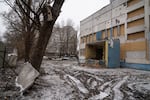
Parts of the maternity hospital in Dnipro were damaged when it was hit by a Russian missile in December 2023.
Claire Harbage / NPR
For more than 30 years, Dr. Iryna Kulbach has delivered babies — "at least 15,000," she says — at a large maternity hospital in this elegant central Ukrainian city.
"Even during war, there is joy in a maternity ward," the doctor says. "We call it 'the place of happiness,' because isn't happiness the smell of a newborn baby?"
Ecstatic new fathers often spray-paint messages of love on the walls outside. "Thank you darling for our little Andriy," says one written in baby blue.
Dnipro, which sits on a river of the same name in central Ukraine, is about 100 miles from any combat zone, but it's become a frequent target of Russian attacks. Still, Kulbach believed — perhaps naively she now says — that her hospital would be spared, even though Russian forces had hit so many others around Ukraine.
That all changed on Dec. 29, 2023. Kulbach arrived at the hospital as an air raid siren blared. The hospital's staff and patients, including four newborns, went into a basement shelter. Then, as Kulbach was going into the shelter herself, a missile hit.
The building shook. She smelled smoke. The hospital was on fire. Other doctors were arriving at the hospital, including Tetyana Andreieva.
"We were supposed to spend a few minutes exchanging New Year's presents," Andreieva says. "But everything was on fire. Broken glass from windows was falling from the sky."
But everyone inside the bomb shelter was alive. When Kulbach emerged, she saw the scale of the destruction. The maternity hospital would have to be entirely rebuilt.
Loading...
On a recent afternoon, she stands outside its ruins, which are cordoned off by a barbed wire fence. On the other side, a young woman waves.
"When are you opening again?" the woman asks. "I want to have my second child here, with you, at this place of happiness!"
The doctor smiles but says later that she's not sure when the hospital will reopen. Ukraine doesn't have the money to rebuild it, she says, and aid from Ukraine's allies looks shakier than ever. Kulbach wants to find hope.
"Look," she says, pointing to clawed-up earth covered with rubble. "That's where a missile hit, and yet 50 meters away, I see children dancing in a playground."
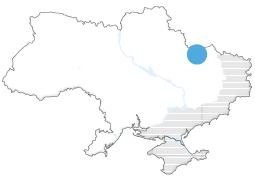
Kharkiv
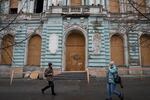
People walk in front of a historic building in Kharkiv that was damaged by a Russian strike.
Claire Harbage / NPR
Ukraine's second-largest city, just 20 miles from the country's northeastern border with Russia, has been under bombardment almost continuously since the full-scale invasion began two years ago.
In the historic city center, the heart of Ukraine's intellectual community, the windows of its modernist buildings are boarded up, though that doesn't mean the businesses inside are closed. A patisserie that sells the city's signature cake, a chocolate-and-wafer delight called Kharkivskyi, has only closed for three weeks in the last two years of war.
"It is very important to feel like the city is alive," says architect Max Rozenfeld. "Because, despite everything that's happened to it, underneath the ruins and the pain, it is."
Rozenfeld is among a group of architects who hope to rebuild Kharkiv after the war, with the help of famed British urban architect Norman Foster, the subject of Rozenfeld's Ph.D. dissertation. The plan envisions Kharkiv as a city for creatives and scientists.
It involves reconstructing bombed-out administrative buildings into artistic gems and creating a vast science hub in Saltivka, a neighborhood that invading Russian troops almost razed.
"Some people are annoyed by this kind of talk," Rozenfeld says. "They say it's very irresponsible to sit in a shelled city and dream about the future."
He understands. Each attack on Kharkiv feels like a body blow to the soul. Rozenfeld brings up a family of five — the youngest was a 10-month-old baby — burned alive on Feb. 12. Their building caught fire after a drone attack by Russians on a nearby oil depot. Rozenfeld had to give a talk the next day.
Loading...
"At first, I didn't think I could do it," he says, "because the tragedy was just so terrible. And then I thought, the more terrible the state of affairs, the more important it is to dream — to not lose hope."
This war won't end anytime soon, he says, and its third year is already bringing a feeling of dread, he adds. Russian troops are advancing in the Kharkiv region. Rozenfeld also fears another Donald Trump presidency, which he says would isolate Ukraine and help the Kremlin.
"Kharkiv is a frontier city, and it's always been able to adapt on its own terms," he says. "Even after everything we have been through, it also has a place for its dreamers."
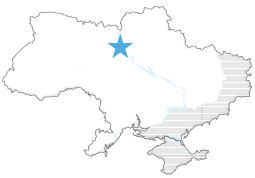
Kyiv
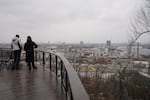
People look out over Ukraine's capital city, Kyiv. Some sense of normalcy has returned to Kyiv, but lawyer Liudmyla Lysenko believes there is a collective anxiety that the Russians will come back to the city.
Claire Harbage / NPR
Ukraine's capital, Kyiv, always felt invincible to Liudmyla Lysenko.
She grew up here, spending weekends exploring the city's large, lush parks or the tree-filled islands on the Dnipro River. It was the center of power and politics.
Yet just days after Russia's full-scale invasion, Russian tanks and armored vehicles sat just outside the city's outskirts. Lysenko's parents called from the suburbs.
"They watched these terrible convoys passing by, counting something like 250 tanks," she says. Those Russian troops would occupy towns outside Kyiv, including Bucha, Irpin and Borodyanka, and torture and execute residents, according to witnesses.
Lysenko would never feel safe in her hometown again, even as normalcy — busy restaurants and bars, playgrounds filled with laughing children — returned. Beneath the normalcy, she says, there is a collective anxiety that the Russians will come back.
Loading...
"They are our enemies because they want to kill us," she says. "We realize that if we don't defend ourselves, they will kill us all."
Lysenko continued working, but her anxiety exhausted her. Sometimes, when she came home, she collapsed on her bed, unable to rise even for an air raid alert. She avoided TV news, which spun a government-approved narrative that is suspiciously upbeat.
"And then one day, for some reason, I turned the TV on," she says, "and I saw this commercial for a course training civilians to defend themselves in case of another invasion."
She signed up right away. She dressed up in her warmest waterproof clothes and drove to a secret location in the woods of the Kyiv region, joining a group that included mostly teenagers in their first year of university.
An instructor handed out paintball guns and first aid kits and began battlefield simulations. How to fight inside a building. How to defend yourself in the forest. How to help the wounded.
"You can't hide from fear," Lysenko says. "You have to face it, and then you won't feel it."
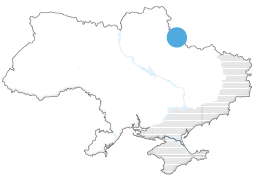
Sumy
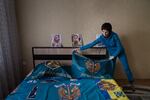
Natalia Kucherenko drapes a flag over the bed in her son's room in the Sumy region of Ukraine. He was captured by Russian forces in Mariupol and Kucherenko waits for him to be returned.
Claire Harbage / NPR
Ukrainian POWs freed in prisoner exchanges usually cross through a checkpoint in this northeastern Ukrainian region, named for its principal city, Sumy. When that happens, Nataliya Kucherenko gets a notification on her phone from the social media app Telegram; she subscribes to a channel that monitors the border for convoys.
Then she gently picks up a giant Ukrainian flag printed with a photo of her 25-year-old son, Vova, and heads to a main road in her hometown, Krasnopillya, barely 15 miles from the Russian border. She unfurls the flag and waits, sometimes for hours, for the convoy to pass.
"It doesn't matter whether it's raining or snow, or whether it's hot, I wait," she says, holding back tears. "I keep hoping he will be on that bus."
Vova has been a prisoner of war in Russia for nearly two years. He defended Mariupol, the southeastern port city on the sea of Azov that Russian troops destroyed and now occupy. She doesn't know where or how he is.
Loading...
A year ago, Kucherenko found an unverified video and post online suggesting he had been sentenced to life in prison in Russia.
"That destroyed me," she says. She says she can't eat or sleep and has lost so much weight that her neighbors say that it's like she's been in Russian captivity herself. Her husband is on the front line, so she's home alone. She has kept Vova's room just as he left it.
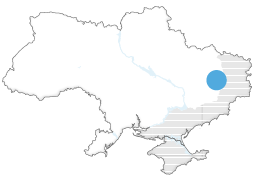
Kramatorsk
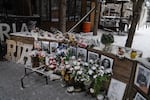
A memorial is set up among the remains of Ria Pizzeria, a beloved restaurant in Kramatorsk that was hit by a Russian strike in June 2023, killing staff and customers.
Claire Harbage / NPR
Ukraine's eastern Donetsk region has been fighting Russia for a decade, since Russia-backed separatists declared independence in 2014. The lively city of Kramatorsk, which remains under Ukrainian control, has learned to live with the ever-present threat of Russian attack.
Its heart-and-soul center was a restaurant, Ria Pizzeria, where locals gathered for weddings, birthdays, christenings and reunions.
"This was our family," especially after Russia's full-scale invasion brought the war even closer, says Iryna Savchenko, one of the co-owners. "It was a home not only for our staff, but also for our family."
Ria Pizzeria became a popular spot not only for locals but for journalists and aid workers drawn by the war. Savchenko says it was a place where you could always hear laughter and music, no matter how grim the news outside was.
"We didn't think at the beginning of the full-scale war that we would be targets," she says. "But we soon found out that everyone in this country can be a target."
On June 29 of last year, a Russian Iskander missile hit Ria Pizzeria. Savchenko had just traveled to Kyiv when she got the call.
Loading...
"They told me everything was gone," she says. She spent all night driving back, arriving at 5 a.m.
"When we arrived, there was a lot of rubble, a lot of destruction," Savchenko says. "I thought everyone inside was dead."
The attack killed 13 people, including pizzeria staff, local teenagers and a talented novelist and poet, Viktoria Amelina. Their photos are in a small, flower-filled shrine outside the pizzeria's ruins. Dozens more were wounded.
Savchenko says the grief broke her. But she didn't want the Russian attack to kill Kramatorsk's spirit, too.
"We decided it would be good for everyone in town if we opened another place," she says. Ria Pizzeria's surviving team wanted to contribute to Kramatorsk's economy, while also honoring those who died.
Six months after Ria Pizzeria's destruction, Savchenko and her partners opened a restaurant in Kramatorsk that's built partly underground. It's called Friends.
"We came up with the name right away, without any discussion," she says. "Because it's a place for our friends, those we know now, those who we will meet and, especially, those who are no longer with us."
Copyright 2024 NPR. To see more, visit https://www.npr.org.
